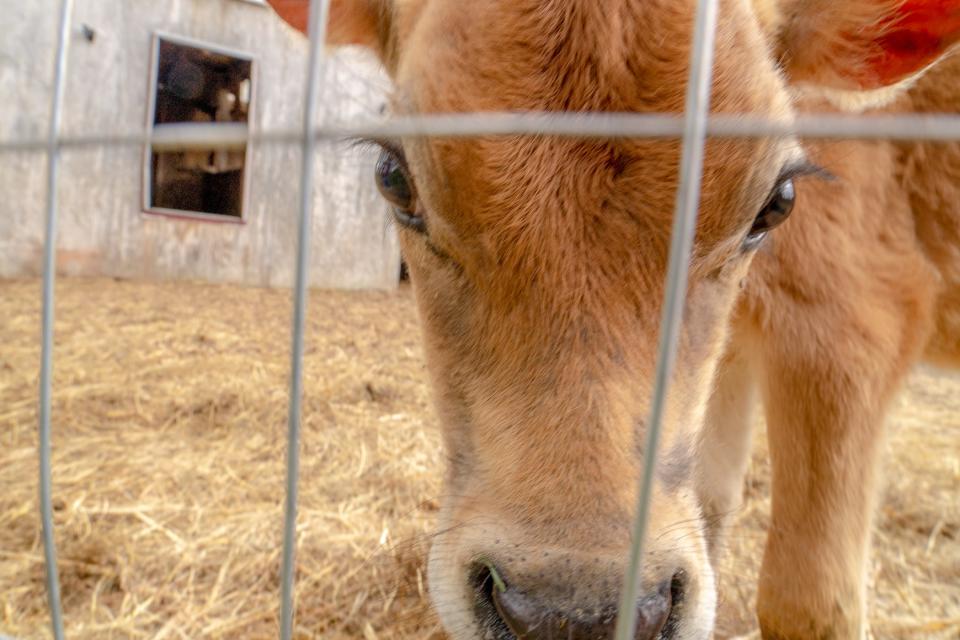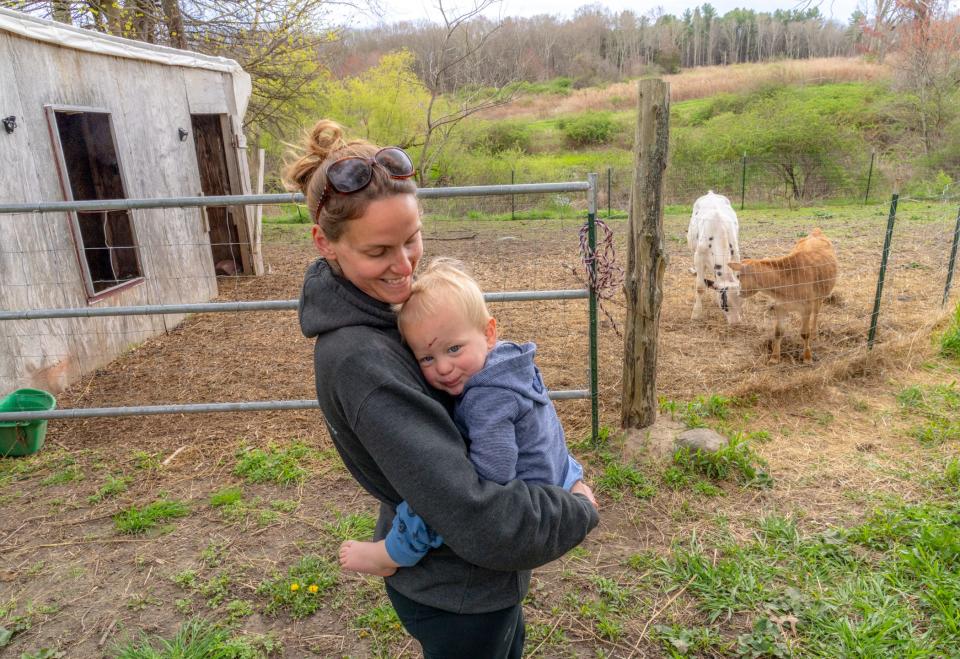RI woman builds 'bull market' to save dairy steers from veal industry
HOPKINTON — Melissa Marsh, 39, has felt sorry for male calves since she was a young girl growing up in Westerly, visiting her grandparents on their dairy farm and learning what happened to the young bulls.
It bothered Marsh that bull calves born from cows bred for milk are usually destined to the slaughterhouse for veal, because milk farmers don't need bulls anymore. Most rely on artificial insemination.
She married Lucas Marsh, a fifth-generation dairy farmer. They had five children, and she still thought little bull calves should be able to enjoy life, even if it was short.
More: New to RI: Goat hikes in Middletown give a whole new meaning to hoofing it
Marsh devised a plan to earn income for her family by buying unwanted dairy males for a song, helping them through the precarious first days after being taken from their mother, then giving them a life on a farm, with other animals, cared for by humans.

Other careers for bull calves
She knew horse people who liked to raise a steer for beef each year. Maybe they would buy a dairy calf from her instead of a beef calf at auction. The young male would get a few months to enjoy what beef cattle enjoy before going to slaughter.
She started offering males from dairy breeds for sale on her in-laws' Elmrock Farm Facebook page. She posted that she had placed a pair of weaned, castrated and dehorned calves on a horse farm to be raised for beef.
"That post went crazy!" she said. People commented that they'd always wanted a cow for a companion animal. Did the farm have any more?
More: 'They need humans': Here's why a RI woman operates an animal sanctuary for farm animals
"I thought I'd be selling animals to people who wanted a steer to raise for beef," she said. She developed an attitude of: "I get what I get and I don't get upset."
Changing her strategy to meet the new demand, she launched her own Bovitique Bulls Facebook page. She brought Jersey calves little bigger than collies to visit preschools and kindergartens. They were a big hit, unfazed by all the little hands, high voices and unexpected sudden moves. They had been conditioned by the Marsh children.

Can you ride a steer?
She posted under a photo of two Holsteins last November: "These 2 boys are almost ready for new pastures! Spitfire & JR (Johnny Ronnie) are between 5-7 weeks old. ... These handsome holsteins are pretty cool dudes! They tolerate a halter but need more training but they love chin scratches and give sloppy slobbery kisses❤ Both are solid and might just make someone a #saddlecattle prospect too!"
Yes, people look for steers suitable for riding.
She learned quickly that instead of making money, she would watch it disappear. That's the thing about Bovitique Bulls: Everyone, human and animal, learns quickly.
More: A look inside West Place animal sanctuary in Tiverton RI
Between September 2021 and the end of April, Marsh fostered and placed about 30 dairy males.
And she disagrees with those who see dairy steers as having little value.
"It depends on what you perceive as value," she said.
dnaylor@providencejournal.com
(401) 277-7411
On Twitter: @donita22
A few caveats
Rhode Island Farm Bureau President Henry B. Wright III keeps cows on his farm straddling the Exeter-West Greenwich line. He offers these cautions:
• A steer needs a full acre of pasture.
• Most farms in Rhode Island are too small to support the number of animals living there, meaning farmers have to buy supplemental feed and minerals.
• A steer eats a bale of hay and 10 pounds of grain a day, whether the farmer can afford it or not.
• There are many underfed farm animals in Rhode Island.
• Some growers would rather donate a load of hay than see animals go hungry.
• A bull is never to be trusted. Wright, 77, knows of three cattlemen killed by bulls that had always been gentle.
• Never assume that a steer was properly castrated. "You won't believe how many steers I've seen that were actually bulls. The job was not correctly done." Even the best can overlook one vital bit.
• Cattle husbandry is one of the oldest occupations on earth, but there's always more to learn. Wright, who keeps cows on his farm straddling the Exeter-West Greenwich line, said he's still learning. These days, a college degree is just a start.
This article originally appeared on The Providence Journal: Bovitique Bulls in RI aims to save dairy steers from veal industry

